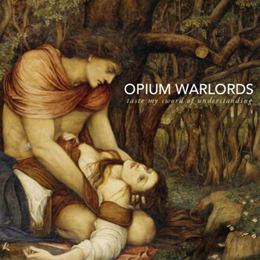
Opium Warlords is the brainchild (at least one of the many) of Sami Albert ‘Witchfinder’ Hynninen, whom you might know from e.g. defunct Reverend Bizarre, Azrael Rising, Spiritus Mortis, Armanenschaft, Lohja SS, March 15 (review of their new record posted on April 27th 2014, by the way), Punisment, KLV, and several more. Opium Warlords return with Taste My Sword Of Understanding, a nine-tracker that lasts for about seventy three (!) minutes. I was enormously pleased with the former full length, We Meditate Under The Pussy In The Sky, updated on February 24th 2013, and initially the successor, being this one, was promised to be released shortly after We Meditate … Unfortunately we had to wait until now, but it was worth waiting for. This album, as a matter of fact, was written and composed in between 1994 and 2009, recorded in 2010 (with Jouni Leppikangas, who did engineer and co-produce the former album too, as well as the higher mentioned March 15-album) and mixed in 2013; the mastering was taken care of by Joona Lukala, also involved with We Meditate … and Our Love Becomes A Funeral Pyre, the March 15-album.
Taste My Sword Of Understanding opens with The Sadness Of Vultures, a dissonant, weird and noisy Drone introduction, which gives a perfect idea of what this album might stand for. Indeed, more of Opium Warlords’ bizarre Doom is yet to come! With The Self-Made Man, Sami opens the border with more traditional-influenced Doom-spheres, for adding Cathedral / Candlemass-alike riffing structures into this slightly sludgy Doom-Drone hymn. There is more focus on melody and rhythm than on We Meditate Under The Pussy In The Sky, and this goes for the bigger part of the album. The label mentions ‘more conventional and easy-to-listen-to levels’, but I won’t exaggerate that much. Yes, this album might be less complex, but you better do not expect a simplistic, predictable result. Still there are many additions of Sixties / Seventies-oriented psychedelics (the organ too, for example, is a good example), and still there is a huge level of experimentation going on. A major difference with the former album might be the lack of coherence on that former album, which has been perfected little more this time. This might seem odd, for the songs on this album were written in a period of almost fifteen years. All right, each single composition is an experimental journey to listen to, but the whole seems to be more coherent, without exaggeration. Yet still, as said, there is a huge diversity in between the tracks, and within each single song. It might be disturbing, and I have to admit that even now, after a handful of listens I am still not getting the total concept. Besides Traditional Doom, Black Metal, Sludge and Drone, the album also includes elements from Funeral Doom, Ambient, Minimal Industrial and Heavy Metal, with (semi-) acoustic and tribal excerpts. Yet overall these songs are not as eccentrically unconventional as before, yet much more unusual than the average Doom-scene. Opium Warlords are distinctive from the grey masses, and whether you like it or not, they do create an own musical universe.
